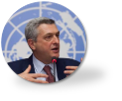Strategic Advisory Council 2021
– with focus on Enhancing Safe and Responsible Data Access
Date: Wednesday September 1, 2021
Time: CEST 13:00-17:00
Location: Webex
@UNHCR/Adrienne Surprenant
Why do we need to discuss Safe and Responsible Data Access?
There is broad consensus that increasing the accessibility of microdata by development practitioners and researchers fosters innovation and inquiry. Making microdata accessible will facilitate policy relevant research and over time enhance global understanding and public discourse on forced displacement. This contributes to improving policies and their operational outcomes, which ultimately leads towards improving the lives of vulnerable people, including forcibly displaced persons (FDP).
But microdata on vulnerable groups carries with them significant risks if they fall into the wrong hands and enable identification of individuals or groups that could subsequently be targeted and harmed. Misuse of microdata may also pose a reputational risk to agencies and institutions that collected and disseminated the data, especially when, as in the case of UNHCR, they have a mandate to protect the population who are the subject of the data.
Due to the above concerns, a considerable amount of microdata currently collected (e.g. through surveys, administrative registries) remain under-utilized in the design of policies and programs as well as research on forced displacement. This leads us to an important challenge: to pursue enhanced microdata accessibility without compromising the protection of data subjects.
What is the JDC’s commitment to enhancing data access?
Enhancing Safe and Responsible Data Access is one of the four Strategic Objectives defined in the JDC Strategy with focus on 2021-2023. Under this objective, the JDC invests in increasing the quantity of available datasets through strengthening existing microdata libraries hosted by the World Bank and UNHCR. Hereunder, we support UNHCR to establish institutional capacity to disseminate microdata systematically and responsibly, and data sharing between the World Bank and UNHCR both in individual operational contexts and in the form of a global data-sharing agreement.
Importantly, our ambition to Enhance Safe and Responsible Data Access extends beyond the World Bank and the UNHCR. In our Strategy, we have set out to work with a broader group of actors, including producers, users and financiers of microdata on affected populations, to develop a common framework for safe and responsible microdata sharing that can guide and systematize better access to data in the short term and beyond 2023. The goal of this work is to improve the efficiency of operational partners’ collaboration in forced displacement contexts through improved data-sharing practices.
To do this, we rely on partnerships and coalitions with humanitarian and development actors, and national statistical offices. Through bilateral/multilateral discussions and consultations, we intend to develop a set of tools, protocols and guidelines for microdata protection and dissemination – that can be applied across organizations and contexts. In parallel, we will engage in training, sensitization and knowledge sharing activities.
How can you as a Strategic Advisory Council member help us?
As a member of the Council, you are representing one of some 70 institutions and organizations along the humanitarian-development continuum, including governments, international organizations, civil society, and academia. Together, you hold a wealth of information relevant to building a common vision and framework for responsible microdata dissemination. Why is making microdata accessible important to your institution? How has your institution been working towards Enhancing Safe and Responsible Data Access? What legal, procedural, or other barriers have you faced? How have you dealt with assessing and managing risks?
Ultimately, whether as a producer, custodian or user of microdata on forcibly displaced, we want to hear your ideas on what a cross-institutional approach to Safe and Responsible Data Access would look like.
Irrespective of whether your institution has worked with Safe and Responsible Data Access for a long time, or are just beginning to address the question, your unique standpoint is important. Share your experience and vision with the Council, so that we together can improve access to microdata in a responsible and efficient manner.
During the Council meeting you will be part of plenary discussions, commentary and Q&A in the chat, live surveys, and working group discussions. We will also co-create an output document of the discussions during the day. You will get access to an online document that we will populate together, and that will feed into the Center’s next Management Committee meeting at the end of September.
What are the objectives of the session?
a) To stimulate a common vision for the Safe and Responsible Data Access agenda with a shared understanding of the potential impact for forced displacement.
b) To progress the dialogue towards Safe and Responsible Data Access within humanitarian and development organizations, civil society, and host country governments.
Agenda
September 1, 2021
Central European Summer Time (CEST)
Moderator: Rolf Parta
13:00-13:30
Opening statements
What difference does Safe and Responsible Data Access make for forcibly displaced?
Dominique Hyde, Chair of JDC Management Committee
Filippo Grandi, UN High Commissioner for Refugees
Björn Gillsäter, Head of Center
13:30-15:00
Panel discussion
How do you make microdata accessible while ensuring the safety of the data subjects?
Olivier Dupriez, Senior Adviser on Data Management and Analytics at the World Bank Development Data Group
Yusuf Murangwa, Director General of the National Institute of Statistics of Rwanda (NISR)
Jean-Martin Bauer, Senior Advisor, Data, Digital Transformation and Innovation, World Food Programme
Mark Hereward, Chief Data Officer & Associate Director of Data and Analytics, UNICEF
Kathrine Starup, Head of Protection Unit – Global Protection Advisor, Danish Refugee Council
Stuart Campo, Team Lead, Data Responsibility – UN Office for the Coordination of Humanitarian Affairs, Centre for Humanitarian Data
15:00-15:15 Break
15:15-16:40
Working groups and plenary discussion
How can we draw on each other to advance this agenda?
16:40-17:00
Reporting back to the Chair
What do we take with us going forward?
Björn Gillsäter, Head of Center
Dominique Hyde, Chair of JDC Management Committee
Speakers
Filippo Grandi
As United Nations High Commissioner for Refugees, Mr. Filippo Grandi heads the UN Refugee Agency (UNHCR) leading the international response to refugee crises around the world, working with governments to ensure that refugees have access to protection and support, and helping find solutions to displacement and statelessness. Grandi was born in Milan in 1957 and has been engaged in refugee and humanitarian work for more than 30 years. From 2010 to 2014, he served as Commissioner-General of UNRWA, the UN Agency for Palestine refugees, having previously been its Deputy Commissioner-General since 2005. He also served as Deputy Special Representative of the UN Secretary-General in Afghanistan and has worked with NGOs and UNHCR in Africa, Asia, the Middle East and at our Geneva headquarters. Grandi holds a degree in modern history from the State University in Milan, a BA in Philosophy from the Gregorian University in Rome and an honorary doctorate from the University of Coventry.
Jean-Martin Bauer
Mr. Jean-Martin Bauer is WFP’s New York-based Senior Advisor on Data, Digital and Innovation. A-20 year UN veteran, he has served in 4 country offices in the Sahel and Central Africa, and in the West Africa regional bureau. Jean-Martin launched the mobile VAM initiative in HQ, winning WFP’s inaugural innovation challenge. Prior to joining WFP New York, Jean-Martin was WFP’s Country Director in the Republic of Congo. A Washington, D.C. native, Jean-Martin holds degrees from the London School of Economics and the Harvard Kennedy School. When they are not overseas, Jean-Martin, his spouse and children live in a small town in West Virginia.
Mark Hereward
Mr. Mark Hereward has been Associate Director for Data and Analytics in UNICEF Headquarters since July 2017. That function is now in the Division of Data, Analytics, Planning and Monitoring. He leads the team which collects, assesses, analyses, stores and makes public data and statistics concerning the situation of children and women. Prior to this he was Deputy Regional Director for UNICEF Eastern and Southern Africa for three years, leading the programmatic support to twenty-one country offices in the region, following five years as UNICEF Representative in Azerbaijan, leading a country programme with particular emphasis on supporting the rights of children with disabilities, and enhancing the voice of adolescents and young people in decisions that affect their lives. From June 2004 to July 2009, Mr. Hereward served in senior positions at UNICEF Headquarters to lead UNICEF’s work on UN Coherence, providing strategic direction to the organization at global, regional and country levels. Mr. Hereward joined UNICEF in April 1995 in the Statistics Section of UNICEF HQ, subsequently moving to UNICEF China as Planning, Monitoring and Evaluation Officer, and to the UNICEF Regional Office for East Asia and the Pacific in Bangkok, where he worked as Regional Planning Officer. Prior to joining UNICEF, Mr. Hereward worked as Field Based Post-Doctoral Research Fellow and Consultant for the Rockefeller Foundation in China. Mr. Hereward also held a Post-Doctoral Research Fellowship at the Carolina Population Centre, USA. Mr. Hereward is a national of the United Kingdom. In July 1985, he received a Bachelor’s degree in Chinese and Economics from the School of Oriental and African Studies, and in 1986, a Master’s degree in Medical Demography from the School of Hygiene and Tropical Medicine, both from London University, UK. He moved to the University of Pennsylvania, USA, receiving a Master’s Degree in Demography in 1987 and a Ph.D. in Demography in 1990.
Stuart Campo
Mr. Stuart Campo is the Team Lead for Data Responsibility at the Centre for Humanitarian Data. He has over twelve years of experience working in the humanitarian and development sectors, with a focus on the safe, ethical, and effective use of technology, data, and social innovation methods. Stuart has worked in over 35 countries, including extended field postings in Kenya, Madagascar, South Sudan, and Uganda. Prior to joining OCHA, Stuart served as a Researcher on Standards and Ethics with the Signal Program on Human Security and Technology at the Harvard Humanitarian Initiative and in a variety of global and country-level roles related to technology and innovation management with UNICEF. Stuart studied Politics at Princeton University and is currently based in the Netherlands.
Olivier Dupriez
Mr. Olivier Dupriez is the Senior Adviser on Data Management and Analytics at the World Bank Development Data Group. He leads a team in charge of developing solutions for improved data documentation, dissemination, and analysis. He was previously in charge of the World Bank’s Microdata Library. His current interests include research and applied work in statistical disclosure control, and applications of machine learning for improving data discoverability. Prior to joining the World Bank in 2004, Olivier worked as a Poverty Statistician at the Asian Development Bank in Manila and as an expert in population census in Cape Verde, Chad, and North Macedonia.
Yusuf Murangwa
Mr. Yusuf Murangwa is the Director General of the National Institute of Statistics of Rwanda (NISR). He is a professional statistician and operational researcher with more than 18 years of experience in statistics development. He has worked on a wide scope of statistics including: labour, education, economic, prices, agriculture, population and censuses and poverty statistics to mention but a few. As the Director General since 2009 he is focused on building the capacity of the national statistics system in Rwanda and advocating for the use of evidence in policy and decision-making. His focus going forward is developing administrative data systems, use of technology in statistics production to improve quality, timeliness and efficiency and establishing an enabling environment for big data and the data revolution in Rwanda. He is playing the leading role in the application of new technology to improve and modernize the national CRVS systems in Rwanda.
Kathrine Starup
Ms. Kathrine Starup is Head of Protection Unit – Global Protection Advisor at the Danish Refugee Council (DRC) and has more than 25 years of experience with humanitarian and displacement work. Kathrine is specialised in Protection, including in Protection Information Management, Community-Based Protection, Solutions to refugee and IDP displacement and Mixed Migration. Kathrine has worked with the UN and international and local NGOs in the field and at headquarters and has field experience from Africa and Asia. Prior to joining DRC, Kathrine worked with UNHCR in the field. DRC is the co-founder of the Joint IDP Profiling Service – JIPS and Kathrine sits on JIPS’ Executive Committee (2009 – ). Kathrine is the co-founder of the Protection Information Management – PIM Initiative (co-lead by DRC & UNHCR). Kathrine represents DRC as the Co-Chair of Data Responsibility Working Group (DRWG). Kathrine sits on the ICRC-led Advisory Group for the ‘Professional Standards for Protection Work’ since 2011, and she is a long-time member of the International Advisory Board to the Forced Migration Review – FMR.
Dominique Hyde
Ms. Dominique Hyde is the Director of External Relations at the United Nations High Commissioner for Refugees (UNHCR), and serves as the Chair of the Joint Data Center’s Management Committee. She is responsible for partnerships with governments, civil society, UN agencies, and the private sector, as well as communications and advocacy, in support of the UN Refugee Agency’s protection and assistance programs. Dominique began her career working for the Canadian Government (Senate, House of Commons and Ministry of Foreign Affairs). She later joined the International Organization for Migration in Haiti. From 1997 to 2010, she worked for the United Nations World Food Programme where she held different positions in Cote d’Ivoire, Liberia, Iraq, Italy and Nepal. In September 2010, Dominique joined UNICEF as Representative for Jordan and in late 2013, she moved to New York as the Deputy Director of the Public Partnership Division. In 2017, she joined the World Health Organization as the Director for Strategic Engagement at their HQ in Switzerland, before joining UNHCR as the Director of External Relations in January 2019. Dominique has and M.A. in International Relations from the University of London, School of Oriental and African Studies, Master Courses in Economics at the London School of Economics, and a B.A. in Communications from the University of Ottawa, Canada.
Björn Gillsäter
Mr. Björn Gillsäter is the Head of the Joint Data Center on Forced Displacement, based in Copenhagen, Denmark. Prior to this, he was the World Bank Group’s Special Representative to the United Nations in New York. Björn joined the Bank in 2001 as Senior Advisor to the Nordic-Baltic Executive Director. He brings over two decades of experience of working on multilateral affairs, both as a government official with the Ministry of Finance of Sweden, and with several international organizations. Some of the other positions he has held include the Alternate Executive Director at the African Development Bank, the Chief for Multilateral System Analysis with UNICEF, the Head of the Multilateral Organization Performance Assessment Network (MOPAN), which is a function hosted by the Organisation for Economic Co-operation and Development.











